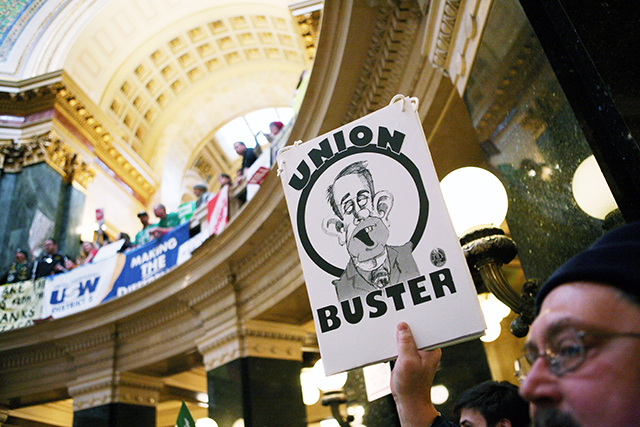
Support justice-driven, accurate and transparent news — make a quick donation to Truthout today!
Scott Walker has struck another blow against democracy.
On Monday, the Republican Wisconsin governor signed into law a bill that made Wisconsin the nation’s 25th right-to-work-for-less state.
For Badger State workers, this is nothing short of a disaster. Contrary to what you might hear on Fox So-Called News or read in The Wall Street Journal, right-to-work-for-less laws are not a recipe for economic success.
In fact, according to the Economic Policy Institute, “8 of the 10 worst states in terms of quality of life are [right-to-work] states.”
And that’s not even the worst of it.
See more news and opinion from Thom Hartmann at Truthout here.
Studies also show that workers in right-to-work-for-less states make less money, get skimpier health benefits and are more likely to die on the job than workers in union security states.
Republicans, of course, like to argue that all this doesn’t matter because right-to-work-for-less states have lower unemployment rates.
But that claim doesn’t really hold up to much scrutiny.
In reality, 7 of the top 10 states in terms of unemployment rate are right-to-work-for-less states, and if anything, the lower unemployment rate in some right-to-work-for-less states probably has more to do with population size than union-busting.
So whatever way you look at it, right-to-work-for-less laws like Wisconsin’s are a raw deal, both for workers and the states they live in.
They also pose a mortal threat to a democratic workplace, and that’s arguably a much bigger problem.
That’s because the real purpose of right-to-work-for-less-laws isn’t to lower wages or gut health benefits – although those are some nice side benefits as far as corporate America is concerned.
No, the real purpose of right-to-work-for-less laws is to totally gut the negotiating power of unions, the most important check we have against concentrated wealth and power.
You see, in its natural state, capitalism looks a lot like feudalism. The CEO is the king, and often lives and travels like one. The senior executives are the lords, and amass great wealth and control the lives and fates of those under them.
The workers, on the other hand, are serfs, and if they dare defy the king or his lords, they can be punished in ways up to and including imprisonment.
This was the way it was for most of our history until the 1930s when labor unions – after years of violence at the hand of elite corporate bosses – finally won the right to organize.
The result was a two-generations-long period of economic equality that Reagan abruptly ended in the 1980s when he began the modern day war on labor.
Make no mistake – unions were fundamental to the broad levels of prosperity that we saw between the New Deal and the Reagan revolution.
That’s because, like the legislative branch in our checks-and-balances system of government, unions are a counterweight to the power of the executive.
Without that counterweight, capitalism reverts back to its feudal origins, which is exactly what’s happened since the Reagan years.
Thanks to the right’s war on labor, union membership is now at a decades-long low, and, as a result wealth inequality is now at a decades-long high.
But unions don’t just make the economy more democratic, they also make the political system more democratic.
Unions are the seeds of small “d” democracy.
When people join unions, they learn what it’s like to work cooperatively towards a common goal and they learn the value of direct action against entrenched power.
It’s no coincidence that the period in US history that saw the highest levels of union participation in the workplace also saw high levels of political activism, and it’s no coincidence that as union membership has plummeted over the past few decades, so too, has the faith the average person puts in our political system.
It’s time for that to change.
Faith in democracy, whether it be in Washington or the workplace, is fundamental to the survival of our republic.
So call your local congressperson today to tell them you support card check, oppose right-to-work-for-less laws, and believe that, as the old labor song goes, “there is power in a union.”
Press freedom is under attack
As Trump cracks down on political speech, independent media is increasingly necessary.
Truthout produces reporting you won’t see in the mainstream: journalism from the frontlines of global conflict, interviews with grassroots movement leaders, high-quality legal analysis and more.
Our work is possible thanks to reader support. Help Truthout catalyze change and social justice — make a tax-deductible monthly or one-time donation today.